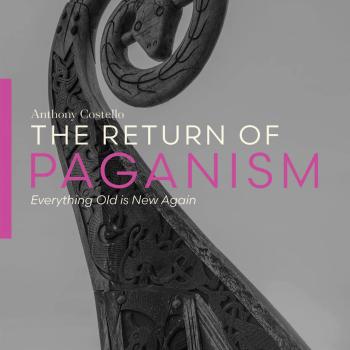Somehow I knew this was coming. I had hinted at it in various FB posts, the occasional Twitter/X tweet and in comment sections on YouTube videos. I knew, eventually, that Jordan Peterson’s comeuppance would, well, come up. I did not look forward to it, nor did I relish in it when it happened. After all Peterson has done an amazing thing. He literally, and almost single-handedly, made theology interesting again to a broader public. As a lay theologian what more could one wish for? Nevertheless, I wasn’t surprised when Peterson’s reckoning did come. At the same time, there is part of me that is glad it finally happened, and I will say more about why toward the end of this post. But first, let’s get readers up to speed. Here’s the quick and dirty of what went down.
Peterson’s Paltry Performance
On a recent debate podcast called “Jubilee,” Peterson was pretty thoroughly thrashed by a group of sharp, young students. Each came well-prepared to challenge Peterson’s vague philosophical positions and his fluid religious commitments, especially those related to Christianity. These challenges were related mainly to the intellectual domains of theology, philosophy, and Church history. Peterson’s actual academic field of psychology did not come up as a topic of debate, and that was clearly too bad, for him (I will address this at the end of the post as well). While some of the challengers were snarky and hard to listen to, most of them had substantive points to make and did a reasonably good job at making them.
That said, in these three areas of study: Theology, Philosophy and Church History, Peterson has felt free to publicly roam over the last several years. And, on occasion and in certain ways, he has presented himself as an expert voice in those fields. Again, not all of this has been bad. As I said above, Peterson’s very public intellectual journey has put theology back on the map and into the marketplace of public discourse, where it is desperately needed. That is no small feat. For this reason, the episode of Jubilee was originally entitled “A Christian vs. 20 Atheists.” Later, however, the title was changed to “Jordan Peterson vs. 20 Atheists” (which still minimally implies “Theist” vs. 20 Atheists). This seems to have been done after Peterson repeatedly denied Christian faith and was, by one interlocutor especially, made to look rather foolish for doing so.
Peterson’s waffling on his own Christian identity, as well as his lack of knowledge of basic tenets of orthodox Christianity, exposed the thinness of his views and the shakiness of his religious convictions. Admittedly, after so many conversations with so many committed and intelligent Christian thinkers (e.g. Peter Kreeft, Fr. Robert Barron, Os Guiness, James Orr, et al.) this was disappointing to watch.
Christians have both cheered Peterson on in his project of exploring Christianity, and cringed along the way at his persistent errors and unorthodox claims. One of the cringiest moments in the Jubilee debate was when Peterson responded to one interlocutor about the purpose of Christianity, and his response went as follows: “In the Christian tradition the purpose of life is to engage in voluntary, upward self-sacrifice so that the kingdom of heaven can be established on earth.” (28.00) In another answer (43:34), when pressed about whether there are intrinsic moral goods, things that are just good in themselves, Peterson says that “good is tied up with goal,” which seems to imply that there are only instrumental goods.
In each of these responses we see a fundamental error in Peterson’s thinking about Christianity, one that is foundational and that we would expect him to have corrected by now. For clearly there are intrinsic goods as well as ultimate goods, or one ultimate good, in Christianity. That intrinsic and ultimate Good is God Himself. Thus, a response we probably would have been right to expect from Peterson, having been surrounded by so many Christians for so long now, would have been something like this:
“The chief end of man is to glorify God and enjoy Him forever.”
Westminster Shorter Catechism
Peterson has indeed been a very mixed bag for conservative Christians since his meteoric rise to online celebrity. Moreover, not only did each of the contestants (is that the right term?) do a good job of critiquing Petersons’s views, many put him on the defensive in a way that made him look emotionally and even physically uncomfortable, if not outright disagreeable. Part of their success was tied up in their unwillingness to be lead astray by Peterson’s rhetoric which, by now, has probably become quite familiar to most observers. In any case, there was no way for Peterson to intimidate his interlocutors or wiggle his way out of the hard positions he was put in. In short, he didn’t do well. But as I said at the start, I knew this was coming.
Why?
Well, first some evidence from the past:
Some Predictions about Peterson
Here is one comment I left on a Dave Rubin video entitled “Joe Rogan and Jordan Peterson Admit Their Friend Went Off the Rails” (basically a video about Peterson and Rogan complaining about Sam Harris) from two years ago:
The Kirkwood Center@kirkwoodcenter
This is the problem when you have two guys who are utterly ignorant of (in Peterson’s case) or antagonists toward (in Dawkin’s case) metaphysics.
7Views
167Views
Shared with Public
For those who are still struggling to understand Jordan Peterson’s approach to “truth,” and who perhaps watched the debate between Peterson and Dawkins on Alex O’Connor’s channel, here is the crux of the academic issue. The excerpt that follows is from D.A. Carson’s PNTC Commentary on John, where Carson is talking about literary vs. higher criticism as they apply to the biblical text:
“‘This crisis of historical narrative’, [Hans] Frei argues, led the Germans to develop higher criticism and thus to question the truthfulness of the Gospel narratives; but it led the English to invent the novel, which conveys its own kind of ‘truth’ — not truth qua historical facts or chronicle, but some deep insight into reality, constructed in historically more or less specific contexts. Therefore the way forward, Culpepper argues, in an age when many thoughtful people ‘cannot accept as historically plausible [the Gospel’s] characterization of Jesus as a miracle worker with full recollection of his pre-existence and knowledge of his life after death’…is not to restrict truth to historical truth and therefore the truth claims of the Gospel, but to recognize the peculiar nature of narrative truth. Culpepper is not saying that the Fourth Gospel’s narratives convey nothing of history; rather, he wants to preserve some sort of blend: ‘The future of the Gospel in the life of the church will depend on the church’s ability to relate both story and history to truth in such a way that neither has an exclusive claim to truth and one is not incompatible with the other…’ Yet not only does his [Culpepper’s] example of miracles in the life of Jesus fail to inspire confidence (Could the resurrection be thrown into the list of negotiable? If not, why not?), but he gives no criteria to guide us, as if the divisions were immaterial.”– Carson, PNTC Gospel of John, 64If you aren’t familiar with Peterson’s defense of the Bible, it is basically a defense using Culpepper’s method, the defense of the Bible, or the biblical stories, as “narratively” true, but, at best, historically a-veridical (or historically unimportant).














